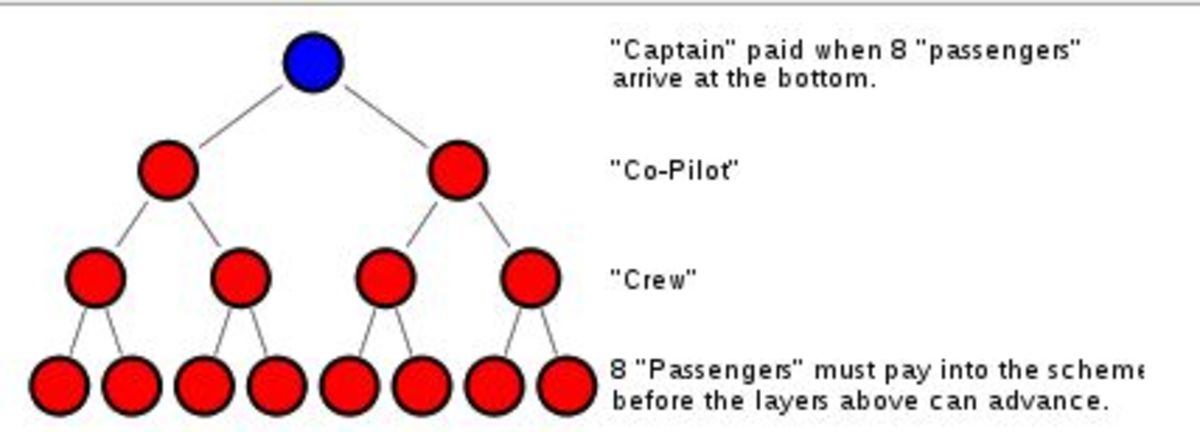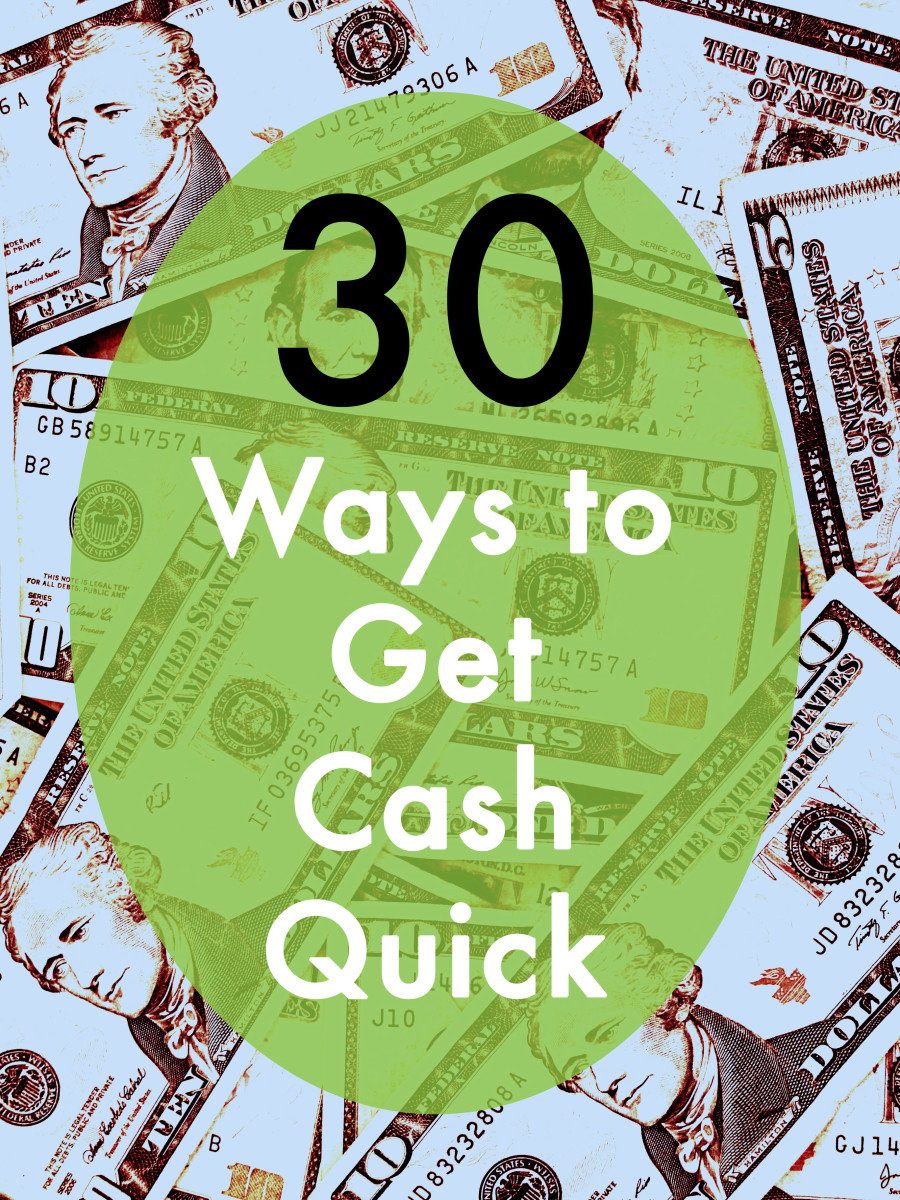7 Questions to Ask When Evaluating Any Income Opportunity; No Stupid People Beyond This Point
Introduction
In a down economy, everybody is looking for "work at home" jobs, second income, and so on, and many are getting conned, as most are scams that need you to pay money up front for this "opportunity" that never pan out. Their greed or fear, but mostly greed, has overpowered their reason.
Here are seven things you need to consider before jumping in ANY
venture.

Why Don't They Sell It Themselves?
Every business is out there to make money, either for the owners or the
investors. WHY would they share their profit with you when they can sell
it directly and cut out the middleman, namely, YOU? After all, we are
talking about the age of the Internet,
where everybody can setup an online presence, and sell to the entire
world. Right? They can offer the stuff for less than YOU can
sell it for.
Or put it another way, how would having YOU sell it add to the value of
the product? Do you represent a niche of a market (location, perhaps)
that wasn't exploited before?
Frankly, the longer the business has been around, the more suspicious
you should be about this sort of opportunity. After all, people *have*
joined, and many probably have made money reselling their stuff. But
what are the chances that nobody near you has already beaten you to it?
In franchising, like opening a McDonald's or Burger King or whatever,
they don't let you open another store like two blocks away. Each store
have its own "territory". There is no such thing as territory when it
comes to merchandising any more, unless your products are truly unique,
and if you bought it from someone else, then it's NOT unique, right?
There are legitimate multi-level-marketing companies out there such as
Amway, Avon, and so on that want to sell directly to consumers through
their "associates" as they want to spend their advertising
dollars on their associates instead of buying expensive TV airtime and
print ads and such. However, there are also those who charge you $$$ for
"introductory kits" that doesn't really say anything to desperate
people who then buy a bunch of junk that nobody would buy, or buy ever
again. Someone made money, but it sure wasn't you!
Same thing applies to any sort of search for "wholesalers I can buy
from" or "reliable drop-shippers". If you can't find a valid reason for
them to want YOU to resell stuff for them, you may want to look MUCH
closer at this alleged opportunity.

Why Don't They Hire Workers at Their Site?
It just makes no sense for any of this "assemble at home" jobs to exist,
because shipping cost $$$. It doesn't cost THAT much to
rent some tables and a room. Why would they spend that money buying
postage, boxes, and packing material, and raw material, wait for you to
finish and ship it back (and take the risk that you never will), THEN
they have to check it for defects, repack it, then ship it to wherever
it goes? You think all that doesn't cost $$$?
There are plenty of workers they can hire anywhere. At their location, they can control the quality better,
control the schedule much better, meet deadlines better, pay practically NO
shipping, and so on. Or they can always have it made in Mexico or China
or where-ever the labor's cheap. It just makes no sense for them to pay you to make it at
your home.
Or perhaps you're thinking about stuffing envelopes of letters to mail?
For some mass mailing company? They have MACHINES to do that sort of
things now. They have paper FOLDING machines. They have envelope
stuffing machines. They even have flap wetting and sealing machines. And
they do it much much faster than you ever can. And they get discounts
from the post office for mailing large batches for pre-sorting and such.
Again, no chance to let you do it. What do *they* have to gain?
Most likely, these are scams to make you buy "intro kits" at inflated
prices, making stuff that they wouldn't bother to pay you for. You are
out of both money, AND time, and get nothing in return. Or they will
charge an "intro fee" to introduce you to this opportunity that you soon
realize turn you into essentially slave labor.

You Get Paid to Do WHAT?
Some of those income offers are for performing relatively simple and dumb activities.
One of the recently popular activity is "taking online
surveys". It's not what you think.
There are occasionally 'study groups' or 'focus groups' that need to
know public opinions on some things, such as political issues, new
products, new movies, and so on. Some may even pay you a small stipend
for your time. I have been on one or two of them. The problem is you
will NOT be asked to join more than a few times in your LIFETIME, as
they need a DIVERSE set of participants to minimize any errors they can
get. And inviting same participants back increases the error rate.
And basically, your opinion is NOT WORTH MUCH. An online survey may take
you 15 minutes to fill out, and even if you get paid for it, it'd be no
more than a dollar. Even if you can do four in an hour, you make at
most $4 per hour, which is LESS than minimum wage. And there aren't
enough surveys to let you fill out surveys 8 hours a day.
And worse, real legitimate surveys are NOT supposed to pay participants.
You ever heard of Gallup Poll paying any one they survey? Nope. It will
skew the results.
Most likely, the website charges you some money to give you a list of
places that actually doesn't cost anything to join. And they probably
copied the list from somewhere else.
The same would apply for anything that doesn't make sense for people to
pay you for doing, including giving you a loan over the Internet. What
are you worth? Really? Why should ANYONE lend YOU money without knowing
you?

Can People Be This Stupid?
A lot of scams relies on "greed" of the victim, and one of the latest scam
is the "mystery shopper scam". They claim they made a mistake and you
can profit from the mistake, but it is you who are making a mistake.
Basically, someone claims to be a mystery shopper recruiter and needs X
number of shoppers who will be given a stipend to shop at a certain
store. Any products they buy they can keep. They will be given some
suggestions to behave in order to test the store employees, and fill out
a questionnaire after the shopping experience.
While there are legitimate recruiters for mystery shoppers out there,
most who advertise online are scammers. Scammers will send you a check
for amount at least twice as large as that you are supposed to be given.
They will claim it's a clerical mistake, and ask you to wire the money
back to them, probably via Western Union.
They want you to do it ASAP so they can cover up their mistake before
their boss finds out or some story like that. Their check is a fake, but
you have to give Western Union real money to wire back. So you are out
of the real $$$, and you get in trouble with the law when you try to
deposit or cash the fake check. And of course, by that time their phone
is disconnected and you have no recourse.
The scammers use the "greed" of "free shopping money" to suck in
victims, the hook them with compassion ("you must help me!"). Think
about it... would a REAL business be stupid / foolish enough to commit
this sort of grave clerical error? But most victims only see dollar
signs and ignore all these "wait, is this too good to be true?"
warnings.
Similarly, beware of too-good-to-be-true offers on Craigslist or eBay items. Buy your BROKEN iPhone for $200, or your used car for $1000 over Kelly Blue Book,
or stuff like that. They will have all sorts of excuses or fantastic
stories, like they need a bad phone for spare parts right this moment,
or they want your car for a special collector. And they claim they need
it now, they'll send someone to collect the item right away. Don't be
stupid.
What Do They Get Out of It?
If you can't figure out how a company is making money by helping you make money, it's probably a scam, as everybody needs to make money to keep operating.
Previously I exposed an international scam known as TVI Express, and analyzed it to be a subset of pyramid scam known as the 8-ball scam. What do they promise? You can turn $250 into $500, then $15000, without selling ANYTHING. Obviously, it is too good to be true, yet it has managed to attract a million people all over the world into putting in money. Clearly, none of these people really bothered to think: wait, how do THEY make their money?
In a pyramid scam, each person recruits two or more people into the network, and after X levels, the person on top leaves with a lot more than he paid to "join in". If all they make are from new members, it's a Ponzi scheme. The biggest red flag is that their own FAQ states that their members are NOT required to sell anything, except recruit more members. If you don't sell anything, where does the money come from?
Please note that giving trial offers, demos, or small samples is NOT what I am talking about. Those are basically "teasers", to get you to try something, so you would buy the whole thing. Companies do offer those. Also, there are random drawings, and often to get it you have to sign up, so you are trading personal information for a chance for physical goods.
The companies you should suspect are the ones that offer things too good to be true, or for cost that is way too low to be reasonable, that they surely cannot be making ANY profit at all, or promise things that would have left them penniless.
Frankly, any sort of "free offer" where they offer stuff that should cost $$$ are automatically suspect. Those "call this 800-number for free foreclosure and public auction information" probably just give you a tease, then have you call a 1-900 number or 976 number (cost $$$ to call) to get the real info, and those are to keep you on the phone for as long as possible.

Why Pay More?
In some scams, people were offered stuff for $$$ when the items are
actually available much cheaper, or free. And there are plenty of
willing victims.
A lot of the "legal scams" out there involves selling stuff to
unsuspecting victims, when the stuff can be found for free or very
cheaply. Perhaps not quite as easily as paying up, but that's another
problem. Things like foreclosure list, government auctions, "eBay profit
kit", and so on are bandied about on TV, Internet, and more. All that
is easily obtained nowadays online or at the local city government
offices and such. Of course, they are going to talk up their stuff as if
it's the next best thing since sliced bread (that's just an idiom).
After all, they want you to pay for it. And of course, they aren't going
to mention that you don't have to get it from them.
Another is selling a service for BIG BUCKS that in reality costs very
little to do, by disguising the service as something essential and worth
a lot more than it actually, or imply that not using it would cost the
victim a lot more than it actually would. One example would be a "fake
filing". In California (and virtually every state) every corporation is required to file updated
information annually. The cost is $25 as of 2010. However, some
companies with official sounding names will send you forms that
emphasize the penalties for NOT filing on time, then charge you $100 or
more to do it for you, and their form arrives month(s) earlier before
you see the real form. If you didn't pay attention, or are scared by the scary looking letter, you'll pay $100 for something that should have cost $25.
On the other hand, if you don't want to check yourself and do the
legwork and save the money, then by all means, spend more $$$ and buy
the information, just don't complain when you did get it and found it to
be not quite as what you expect.

Can You Sell That More Than Once or Twice?
Even assuming that the product you sell IS real, and the company is not
out to cheat you, are you really selling the right product?
There are products that you use, and there are products you use up.
Amway and Avon and such have products that you use up, such as
detergent, nutritional supplements, beauty products, and always need
more of that sort of stuff. Once you got a client, you got a lifetime of
orders, albeit small ones. The products that you just use... well, you
will need to keep finding new clients unless the stuff breaks. So,
either the stuff is so flimsy that the people will never come back, or
they will never come back because they are satisfied with what they got.
Either way you hard, very hard, to find new clients.
I had a friend who used to sell "personal security products" (door
motion beepers, personal distress sirens, and so on). I told him it's a
deadend job because one person only needs ONE of each, and his social
circle is only so large. He eventually realized I was right: he ran out
of marketing prospects very quickly.
Consider the product you may be selling. Would a typical person need
more than one or two of them? That's the problem with a lot of these
products. I saw one of those late-night infomercials with a company that
wants you to start a business with just $25 selling their shelf-display
statues and knick-knacks. Well, would a typical person need more than
one or two of those? I don't think so! Another would be selling phone
services. Would any one actually NEED more than one phone service (or
phone)?
Conclusion
There are only two ways to make money: you sell physical items people want, or you sell services people want.
To profit from that, you need to find out what you can provide, THEN you find out what's common between supply and demand, and that's the stuff you need to "supply" to meet the "demand". That's it, really.
There are legitimate opportunities out there, but you must keep some perspective in mind to pierce the facade of all that sweet talk, and consider the REALITY of the situation. Hopefully, these seven questions will pour some cold water over your head so you can consider the situation with some semblance of reality.
Other Information About Evaluating Opportunities
- How an Internet Ponzi or Pyramid Scheme Works, and How to Avoid Such a Scheme
Learn how Internet Pyramid Scheme and Ponzi Scheme operate, and how you can spot them with simple list of 5 questions and a dose of skepticism. - How to Research a Network Marketing Opportunity on the Internet
Are you interested in a network marketing opportunity and want to find out more about it? Here's how to use the Internet to avoid the hype and get to the real information to make a proper evaluation. - How Does a Scam Mess with Your Head: MLM, eWallets, ...
Do you know the three factors used in cost/benefit equation? It's cost, benefit (also called gain or value), and risk. Learn how a real scam mess with your estimate of those three factors. - 9 x signs your MLM Opportunity is actually a scam (H...
Multi-level Marketing (MLM) is hardly new, but it is one of the least-regulated type of business, as it is one of the youngest. Basically, instead of just selling, there is a bit of recruiting as well, and...






